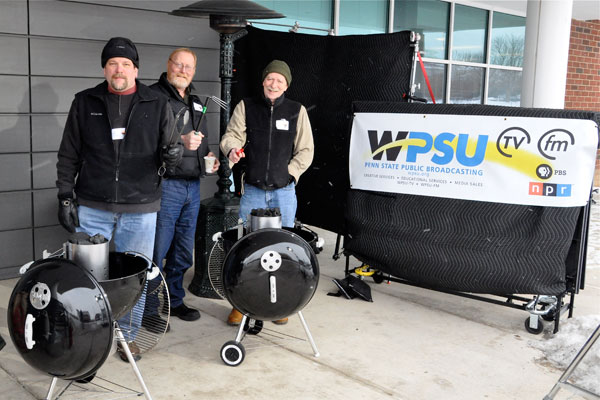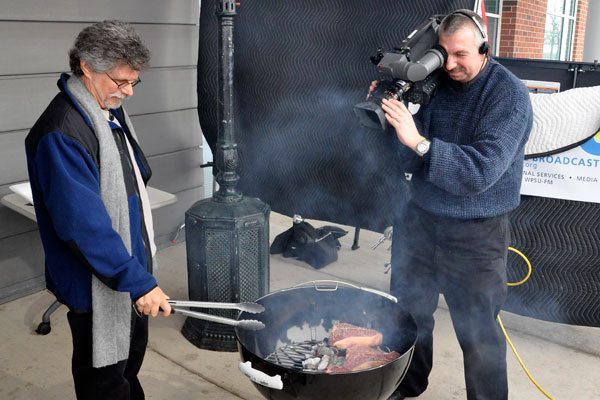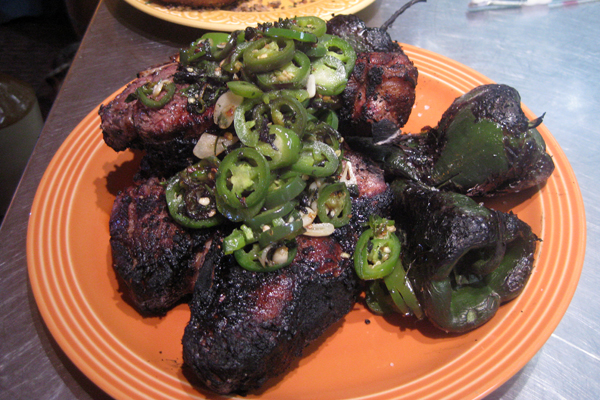Community /
Blogs
The opinions expressed in these blogs are solely those of the people who wrote them, and do not represent the views of WPSU or Penn State University.
Local Food Journey
Caveman Steaks
Posted by Sam Komlenic on 05/24 at 12:07 PM

WPSU Cavemen. Photo Credit Emily Wiley.
Until a few months ago, I had never heard of Caveman Steaks, but then Grillmaster Steven Raichlen entered my life. He is the subject of the PBS cooking series Primal Grill and is the author of The Barbecue Bible and Planet Barbecue, and he was also the guest chef at WPSU-TV’s annual Connoisseur’s Dinner. During his visit, the station hosted a cooking demonstration for donors and friends at our studios.
Steven is a great guy—very knowledgeable and capable, yet very low-key. The featured course, to be prepared outdoors on a cold February day, was his signature dish. The process is so simple and so primitive as to be almost disarming, yet the result is to die for.
The key to this awesome technique is natural lump charcoal—simple charred chunks of what was once solid wood—as opposed to briquets. Briquets contain ground charcoal that is combined with other ingredients like sawdust, coal, binders, ignition agents, etc. Lump charcoal is essential to these blackened, beefy steaks because they will be cooked directly on the coals—just like cavemen would have done!
Lump charcoal is also the key to my working closely with Steven that day. I am a lump charcoal evangelist. I’ve been cooking with it for decades, since I first saw it in use at the Watkins Glen racetrack campground. Lump lights faster and burns hotter and more quickly than briquets, and the end result is cleaner burning coals that get the job done much faster than briquets.
Anyway, the station needed someone who had lump experience to prepare and tend the grills outside while Steven was entertaining inside, and I was enlisted. The ideal way to start lump charcoal is in a chimney device specifically designed to light charcoal. It uses a few sheets of newspaper to light the coals and works pretty quickly. I prefer to light mine somewhere other than the grill, since the newspaper leaves a fair amount of ash behind. I will say this right now: DO NOT USE LIGHTER FLUID!! Otherwise that stinky stuff will be all over your beautiful steaks. Hey, it is natural charcoal … let’s keep it that way!
With the capable assistance of two friends, we kept things hot until the Grillmaster arrived to perform his fired-up magic act.
Steven starts with two-inch thick T-bone steaks; big, beautiful, custom-cut cow slices that are impressive just sitting on the plate. The only preparation that’s necessary is to rub each side of the steaks with an obscene amount of coarsely ground salt and pepper. We had prepared a bed of red-hot coals about three inches thick on a Weber grill so that two-thirds of the grate was covered. Leave a smaller, cleared “cool zone†at the front to keep the griller safe and their hands out of the heat. The coals are fanned lightly with a magazine or a piece of cardboard to blow away any light ash.

Steve Raichlen Grills Caveman Steaks. Photo Credit Emily Wiley.
Here’s where the show begins—and what a show it is! Using grill tongs, place each steak directly on the glowing bed of coals. In no time, the steaks are sizzling and smoking, the juices providing a light show of small flare-ups around their edges. Check the steaks by lifting them slightly with the tongs. When they are dark brown and crispy-looking (about five or six minutes), flip them and repeat the process. As you remove the steaks from the fire, tap the tongs on the rim of the grill to knock off any hot embers that might have attached themselves during cooking.
This method provides a smoky, charred crust around the entire steak, while leaving the center rare to medium-rare. I have found that you can adjust the process a bit. If you prefer your steaks medium, you can cut them to about an inch-and-a-half instead and they’ll cook just right. You can’t leave them on for much more than six minutes per side, either, because the direct contact with fire will really char the meat after that point.
Give Caveman Steaks a try this summer. You can even use the leftover coals to prepare peppers and garlic with olive oil in a pan to use as a topping for the beef. You’ll be the most admired griller in your neighborhood, and you’ll treat your family and friends to an experience and a taste they’ll never forget. Watch Steven do a demonstration of the entire technique.

Caveman Steaks. Photo Courtesy SavorSA.
Let the Local Food Journey know what you’re planning to grill this Memorial Day, no matter what the ingredient or technique. It’s time to get grilling … the best part of summer!
Find your local meat at the Penn State Meat Sale, Nature’s Pantry in State College, Brenneman’s Meat Market in Huntingdon, or Cow-A-Hen Farm at the Boalsburg Farmers Market.
![]() Author: Sam Komlenic
Author: Sam Komlenic
Bio: Corporate Support, WPSU | Copy Editor for Malt Advocate, the Magazine for the Whisky Enthusiast | Cook About Town and Grill Freak
Leave a Comment
Commenting is not available in this section entry. « Summer Solstice Celebration on June 18th Take Action Tour 2011: Pittsburgh, May 26th »Most recent entries
 Our Local Food Journey comes to an end
Our Local Food Journey comes to an end- Wednesday, January 31, 2018
- By Jamie Oberdick in Local Food Journey
 Winter isn’t a quiet time at the farm
Winter isn’t a quiet time at the farm- Wednesday, January 31, 2018
- By James Eisenstein in Local Food Journey
 Get the taste of garden season right now by growing herbs indoors
Get the taste of garden season right now by growing herbs indoors- Friday, January 26, 2018
- By Jamie Oberdick in Local Food Journey
 All you need to know about PASA’s Farming for the Future conference
All you need to know about PASA’s Farming for the Future conference- Friday, January 19, 2018
- By Jamie Oberdick in Local Food Journey
Categories
Archives
- January 2018
- December 2017
- November 2017
- October 2017
- September 2017
- August 2017
- July 2017
- June 2017
- May 2017
- April 2017
- March 2017
- February 2017
- January 2017
- December 2016
- November 2016
- October 2016
- September 2016
- August 2016
- July 2016
- June 2016
- May 2016
- April 2016
- March 2016
- February 2016
- January 2016
- December 2015
- November 2015
- October 2015
- September 2015
- August 2015
- July 2015
- June 2015
- May 2015
- April 2015
- March 2015
- February 2015
- January 2015
- December 2014
- November 2014
- October 2014
- September 2014
- August 2014
- July 2014
- June 2014
- May 2014
- April 2014
- March 2014
- February 2014
- January 2014
- December 2013
- November 2013
- October 2013
- September 2013
- August 2013
- July 2013
- June 2013
- May 2013
- April 2013
- March 2013
- February 2013
- January 2013
- December 2012
- November 2012
- October 2012
- September 2012
- August 2012
- July 2012
- June 2012
- May 2012
- April 2012
- March 2012
- February 2012
- January 2012
- December 2011
- November 2011
- October 2011
- September 2011
- August 2011
- July 2011
- June 2011
- May 2011
- April 2011
- March 2011
- February 2011
- January 2011
- December 2010
- November 2010
- October 2010
- September 2010
- August 2010
- July 2010
- June 2010
- May 2010
- April 2010
- March 2010
- February 2010
- January 2010
- December 2009
- November 2009
- October 2009
- September 2009
- August 2009
- July 2009
- June 2009
- May 2009
- April 2009
- March 2009
- February 2009

NO COMMENTS